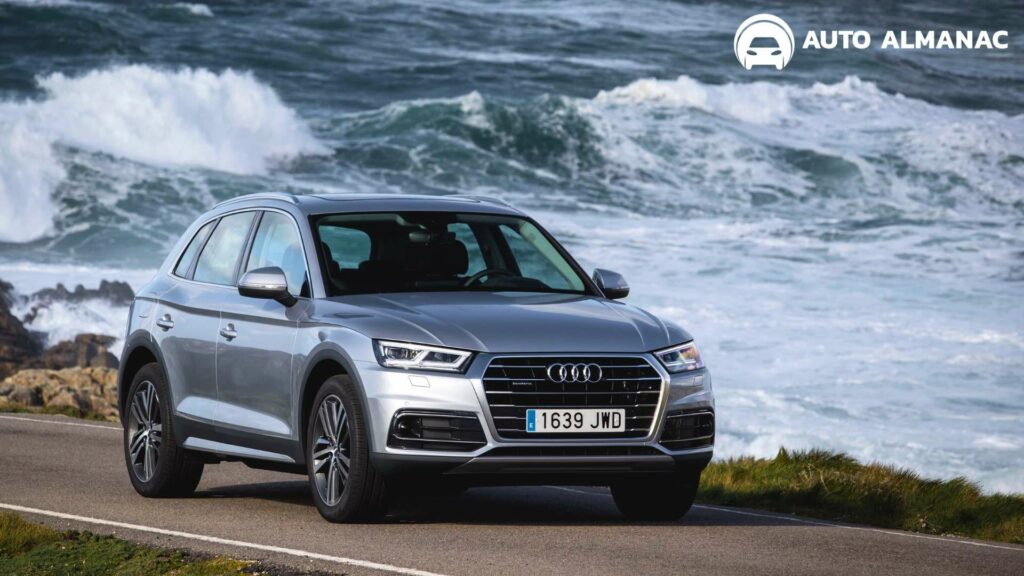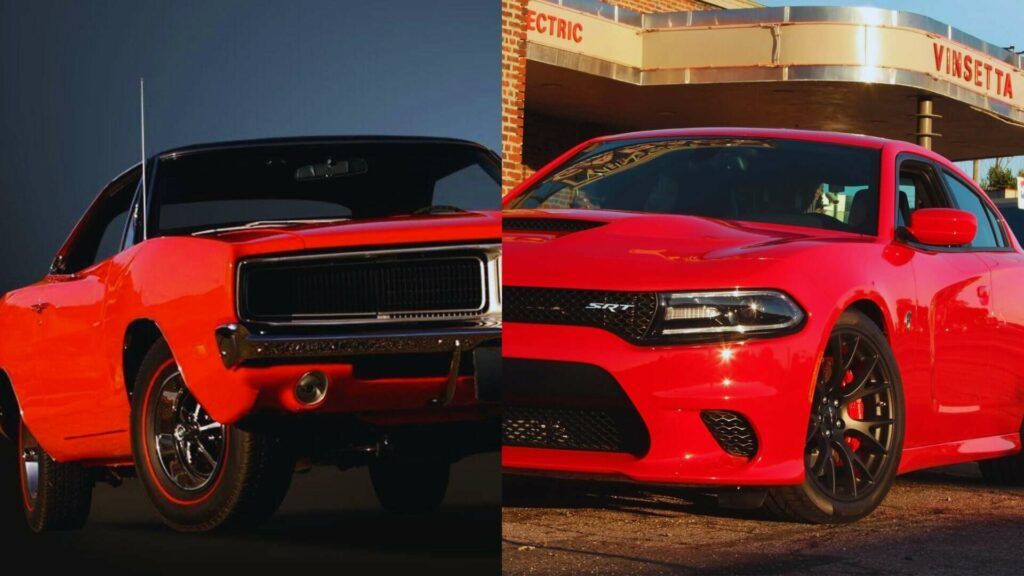Living in comfort and luxury while having the performance to make you forget that you’re in a 2-ton SUV is how we’d like to describe our experience with the Audi Q5.
Sure, it’s not out there to set new Nurburgring lap records, but it’s also good to realize that you’re not going to feel that performance even in LA traffic if you end up putting the wrong type of fuel in.
So if you don’t want to be stuck in the slow lane on the German autobahn, fill up your tank with these types of fuel for the Audi Q5 and punch it just a bit more!
What type of gas does an Audi Q5 take?
All Audi Q5 gasoline/petrol models can take regular 87-octane (91 RON) unleaded gasoline, though the manufacturer recommends premium 91-octane (95 RON) gasoline for the best performance and fuel economy.
Audi Q5 diesel models can take ultra-low sulfur diesel (ULSD) #2 or 5% biodiesel (B5).
When it comes to what the minimum octane rating of gasoline you can put in the Audi Q5 is, this German luxury SUV can take as low as regular 87-octane (91 RON) gasoline in the tank.
However, Audi has been consistent in its recommendation of at least premium 91-octane (95 RON) gasoline for many of its modern models, and this is also true for the Audi Q5.
According to the manufacturer, filling up with premium gas will give you the most optimum performance and fuel economy out of any of the Audi Q5’s gasoline (petrol) engine options.
Now, this doesn’t mean that the minimum requirement of 87-octane fuel should be completely avoided in favor of premium fuel. Regular fuel just serves as the lowest that you can go just in case you’re not able to find any premium fuel nearby.
But while a modern vehicle like the Audi Q5 can adjust to regular or lower-octane fuel via its computer (ECU), it’s still not recommended to stick to such fuels for prolonged periods of time, as it can reduce your performance and economy.
As for diesel models of the Audi Q5, the requirement is to only use ultra-low sulfur diesel (ULSD) #2 as your primary fuel. Alternatively, you can also use up to 5% biodiesel fuel blends.
Audi Q5 Fuel Requirements by Generation and Engine Option
All Audi Q5 generations have a minimum fuel requirement of 87-octane gasoline for gas models, though premium 91-octane gasoline is recommended for optimum performance and fuel economy.
Audi Q5 diesel models require ultra-low sulfur diesel (ULSD) #2, while up to 5% biodiesel may also be used.
1st-Generation Audi Q5 (8R) (2009 to 2017)
| Engine Option | Minimum Fuel Requirement |
| 2.0L TFSI I4 Turbo(2009 to 2012) | 87-Octane Gasoline (Regular)(91-Octane Recommended) |
| 2.0L TFSI I4 Turbo(2013 to 2017) | 87-Octane Gasoline (Regular)(91-Octane Recommended)(E-85/Flex-Fuel Capable) |
| 3.0L TFSI Supercharged V6(Facelift) | 87-Octane Gasoline (Regular)(91-Octane Recommended) |
| 3.2L FSI V6 | 87-Octane Gasoline (Regular)(91-Octane Recommended) |
| 2.0L TFSI I4 Turbo Hybrid | 87-Octane Gasoline (Regular)(91-Octane Recommended) |
| 2.0L TDI I4 Turbo Diesel | Ultra-Low Sulfur Diesel #2 |
| 3.0L TDI V6 Turbo Diesel | Ultra-Low Sulfur Diesel #2 |
First introduced in 2008 for the 2009 model year, the 1st-generation Audi Q5 SUV was released with a mixture of gasoline and diesel engine options for various markets.
North America initially only received the naturally-aspirated 3.2-liter FSI V6, but the turbocharged 2-liter TFSI I4 was eventually carried over in 2011 after already being out for 2 years in other markets.
From 2013 until 2017, the 2-liter TFSI I4 has been given E-85/Flex-Fuel capability, making Q5 models with this engine made between these years the only FFV (Flex-Fuel Vehicle) versions of the SUV.
Other gas/petrol engine options include the 2-liter I4 turbo hybrid and the supercharged 3-liter TFSI V6, both of which were introduced on the 2012 facelift models.
All 1st-gen Audi Q5 gasoline/petrol engines are recommended to be filled up with premium 91-octane gasoline, though they’re also capable of using a minimum of regular 87-octane gasoline if no other option is available.
Both the 2-liter and 3-liter TDI turbo diesel engines are specified to use ultra-low low sulfur diesel #2, otherwise known as ULSD #2. This type of diesel meets the ASTM D975 standards for diesel fuel.
2nd-Generation Audi Q5 (80A) (2018 to 2023/Present)
| Engine Option | Minimum Fuel Requirement |
| 2.0L TFSI I4 Turbo (252 hp) | 87-Octane Gasoline (Regular)(91-Octane Recommended) |
| 2.0L TFSI I4 Turbo Hybrid (MHEV)(249 hp) | 87-Octane Gasoline (Regular)(91-Octane Recommended) |
| 2.0L TFSI I4 Turbo Hybrid (PHEV)(367 hp) | 87-Octane Gasoline (Regular)(91-Octane Recommended) |
| 2.0L TDI I4 Turbo Diesel(Select Markets Only) | Ultra-Low Sulfur Diesel #2 |
The 2nd-generation Audi Q5 was given the design code “80A” for the 2018 model year and now presents an engine lineup that’s completely made up of 2-liter 4-cylinder power plants.
The majority of the 2-liter engines are, of course, gas or petrol engines, while their 2-liter “TDI” diesel counterparts were not offered in North America and are found only in select markets internationally.
The 2-liter I4 primarily comes in three forms, a standard 252-hp version, a 249-hp mild-hybrid version (MHEV), and a 367-hp plug-in hybrid version (PHEV).
Regardless of which 2-liter engine you choose, all gasoline/petrol engine options of the 2nd-gen Audi Q5 still require a minimum of 87-octane fuel, while premium 91-octane fuel is recommended to get the best out of the engines.
As with the previous generation, the 2nd-gen Audi Q5’s 2-liter TDI I4 turbo diesel engine is designed to run on ultra-low sulfur diesel #2.
Premium Unleaded Fuel in an Audi Q5
Premium unleaded fuel, which starts at an octane rating of at least 91, is the manufacturer’s preferred choice of fuel for the Audi Q5.
Filling up the Audi Q5 with premium 91-octane gasoline or higher yields the best performance and fuel economy out of its gasoline/petrol engine lineup.
Part of the reason to go for premium when you can is that Audi likes to slap on a turbocharger in a lot of its vehicle models like the Q5 SUV.
This means that using higher-octane fuels can actually be beneficial due to the higher compression ratios of turbocharged or forced induction engines. High-compression engines are more prone to detonation, after all.
Since higher-octane premium fuel is harder to detonate, this allows the Audi Q5’s engine to operate at higher pressures without the fuel detonating, resulting in better performance and efficiency.
Now obviously, running regular 87-octane gas is still fine if, for some reason, there’s no premium gas to be found nearby. After all, it is the minimum required octane for the Audi Q5.
However, it’s not recommended to run on just regular gas on the Audi Q5 in the long run, as you will be slightly reducing the performance and fuel economy of the engine by using lower-octane fuels on a high-compression engine.
Octane Rating and the Audi Q5
The Audi Q5 is designed to use gasoline with a minimum octane rating of 87 AKI (91 RON), while 91-octane (95 RON) is recommended for optimum performance and fuel economy.
Any type of fuel below 87-octane should not be used for the Audi Q5 so as to not cause engine knock and damage.
Types of Gasoline/Fuel That Can Be Used in an Audi Q5
The Audi Q5 can be filled up with TOP TIER detergent gasoline, reformulated gasoline, up to 15% ethanol blends (E-15), and E-85/Flex-Fuel (2013 to 2017 2.0T models).
Audi Q5 diesel models can be filled up with ultra-low sulfur diesel (ULSD) #2 and up to 5% biodiesel (B5).
TOP TIER Detergent Gasoline
When choosing the best fuel for the Audi Q5 or any other vehicle, it’s best to go for what the manufacturer recommends. In this case, it’ll be non-other than TOP TIER detergent gasoline.
TOP TIER gas has high standards when it comes to using detergent additives, which have been specifically formulated to give the most effective and safe engine-cleaning benefits.
Any carbon buildup or deposits inside the engine are cleaned when using TOP TIER detergent gasoline, thereby maintaining engine performance and fuel economy.
And before you forget, make sure to still stick to the minimum octane rating of 87 for the Audi Q5. Or better yet, go for Audi’s recommendation of premium grade 91-octane fuel to get the best possible benefits.
TOP TIER gas retailers can be found all across North America, and you can spot one by looking for the “TOP TIER” label at your local pumps.
Reformulated Gasoline (RFG)
Reformulated gasoline, or “RFG”, is a more modern and cleaner-burning alternative to the conventional gasoline being sold for decades.
While Audi doesn’t specifically talk about the use of RFG in the Q5’s owner’s manual, we’ve known that it’s been developed for safe use on the majority of vehicles on the road today, and many other automakers recommend it as well.
We’re also familiar with RFG’s environmental benefits because of its blend of less-toxic ingredients, resulting in cleaner emissions that do not contribute as much to the formation of ozone and other air toxins.
While reformulated gasoline already makes up over 30% of all gas sold in the US, it can still be tricky to distinguish it from non-reformulated gas. Thus, it’s good to ask your local retailers if it’s available should you choose to fill up with it.
Up to 15% Ethanol Blends (E-15)
Ethanol is a type of oxygenate that’s blended into gasoline to make it more renewable and reduce emissions, and one of the most common types of blends is E-15.
As its name suggests, E-15 contains up to 15% ethanol blended with pure gasoline, and this is just about the limit of ethanol percentage that you can put in the Audi Q5 and most gasoline-powered cars today.
If you put any fuel with a higher ethanol content than 15%, then you risk corroding and damaging your fuel system and engine components due to ethanol’s tendency to absorb water.
Vehicle models that can only take up to 15% ethanol can be considered as non-FFVs (Flex Fuel Vehicles), so they will only come with a regular black gas cap.
E-85/Flex-Fuel (2013 to 2017 2.0T Models)
We’ve started talking about ethanol blends in the last entry, so let’s keep the ball rolling by talking about another type of ethanol blend that’s compatible with certain Audi Q5 models called “E-85”.
E-85, also popularly known as “Flex-Fuel”, can contain up to 85% ethanol and only 15% pure gasoline, and it should only be used in Flex-Fuel Vehicles (FFVs).
The only Audi Q5 models that are capable of using E-85/Flex-Fuel are those equipped with the turbocharged 2-liter TFSI I4 engine from the 2013 to 2017 model years.
Putting E-85 or any fuel with over 15% of ethanol content in any other Audi Q5 model will otherwise corrode and damage metallic and plastic components of the fuel system and engine.
If a certain model is an FFV, then it will come with a unique yellow gas cap instead of the usual black gas cap.
Ultra-Low Sulfur Diesel (#2 Diesel) (Diesel Models)
Diesel variants of the Audi Q5 that are sold in select markets are specified to primarily use ultra-low sulfur diesel #2 (ULSD #2).
ULSD is a type of diesel that contains up to 15 ppm of sulfur content only, resulting in cleaner emissions from the combustion of diesel fuel.
While ultra-low sulfur diesel can be found across different markets, the Audi Q5 diesel model’s need for ULSD #2 is according to the ASTM D975 standards on diesel fuel.
Thus, if you live anywhere else that doesn’t go by this standard, be sure to follow any equivalent national specification for diesel fuel in your area.
Up to 5% Biodiesel (B5) (Diesel Models)
Aside from the standard diesel fuel, up to 5% biodiesel (B5) can also be an alternative for diesel models of the Audi Q5.
Usually made from recycled vegetable oil or animal fats, biodiesel fuel is more renewable and is able to burn cleaner compared to conventional diesel.
Biodiesel fuel that contains higher than 5% of content should otherwise be avoided for the Audi Q5 because it can form engine deposits faster on an engine not designed for it.
Types of Gasoline/Fuel to Avoid for the Audi Q5
Avoid filling up the Audi Q5 with gasoline containing MMT, fuel containing silicon or metallic additives, leaded gasoline, and any fuel with a lower octane rating than 87 AKI (91 RON).
Gasoline Containing MMT (Methylcyclopentadienyl Manganese Tricarbonyl)
MMT is a type of additive that has been used as an octane booster for both leaded and unleaded gasoline for several decades, though the majority of fuel brands today do not include it in their blends due to its negative effects.
While Audi doesn’t mention of MMT in the Q5 owner’s manual, it’s best to completely avoid using this additive due to its tendency to foul spark plugs and damage different components of the emission system.
On top of that, MMT is also pretty toxic to the environment (and your lungs) when emitted through gasoline, and numerous health concerns have been raised in the past because of this.
Fuel Containing Silicon or Metallic Additives
Other types of additives that you shouldn’t put in your Audi Q5’s gasoline are silicon or metallic-based additives.
The manufacturer does not recommend using gasoline that contains silicon or metallic-based additives for the Audi Q5, as its fuel system is not designed to take such materials.
You’ll also potentially damage your catalytic converter permanently when using metallic materials, similar to the effects of using leaded gasoline.
Leaded Gasoline
As of a couple of years ago, leaded gasoline has already been banned for use in land transportation worldwide, except for a few applications in some motorsports.
This is for a good reason, as leaded gasoline is known to be pretty toxic when emitted even by the emissions standards of several decades ago.
And as we’ve mentioned in the previous entry, it’s quite notorious for deteriorating your car’s catalytic converter, and you wouldn’t want this important emission system component to suddenly stop working on your car.
Alternative Fuel Options for Audi Q5 Models
Certain 2013 to 2017 Audi Q5 models with the 2-liter I4 engine can use up to 85% ethanol (E-85/Flex-Fuel), a type of alternative biofuel.
Audi Q5 hybrid models also employ an electric motor paired with a lithium-ion battery as an alternative source of power to their standard-equipped gas engines.
Audi Q5 Gas Mileage Per Generation
The Audi Q5 has a combined gas mileage of 16 to 26 mpg (1st gen) and 24 to 26 mpg (2nd gen) depending on the engine option and model year.
Audi Q5 hybrid models can achieve a combined gas mileage of 26 to 27 mpg (gas only) and 50 to 65 MPGe (gas + electric).
1st-Generation Audi Q5 (8R) (2009 to 2017)
| Engine Option | MPG (City) | MPG (Highway) | MPG (Combined) |
| 2.0L I4 Turbo(Premium Gasoline) | 20 mpg | 27 to 28 mpg | 22 to 23 mpg |
| 2.0L I4 Turbo(E-85/Flex-Fuel) | 14 mpg | 19 mpg | 16 mpg |
| 2.0L I4 Turbo Hybrid(Q5 Hybrid) | 24 mpg | 30 mpg | 26 mpg |
| 3.0L V6 Turbo Diesel | 23 mpg | 30 mpg | 26 mpg |
| 3.0L Supercharged V6 | 18 mpg | 26 mpg | 21 mpg |
| 3.2L V6 | 18 mpg | 23 mpg | 20 mpg |
2nd-Generation Audi Q5 (80A) (2018 to 2023/Present)
| Engine Option | MPG (City) | MPG (Highway) | MPG (Combined) |
| 2.0L I4 Turbo | 22 to 23 mpg | 27 to 28 mpg | 24 to 25 mpg |
| 2.0L I4 Turbo(Quattro) | 23 mpg | 29 mpg | 25 to 26 mpg |
| 2.0L I4 Turbo(S-Line Quattro) | 22 mpg | 29 mpg | 25 mpg |
| 2.0L I4 Turbo(Sportback S-Line Quattro) | 22 mpg | 29 mpg | 25 mpg |
| 2.0L I4 Turbo Hybrid(Premium Gasoline) | 26 to 27 mpg (Combined) | ||
| 2.0L I4 Turbo Hybrid(Gas + Electric) | 50 to 65 MPGe (Combined) | ||
What is the gas tank size/capacity of the Audi Q5?
1st-gen Audi Q5 models have a gas tank size/capacity of 19 to 19.8 gallons (71.9 to 75 liters), while 2nd-gen models have a gas tank size/capacity of 14.3 to 18.5 gallons (57.9 to 70 liters) depending on the model year, engine, and trim level.
| Audi Q5 Generation/Model Years | Engine/Trim Level | Gas Tank Size/Capacity (US Gallon/Liter) |
| 1st Generation (8R)(2009 to 2017) | 2.0L I4 Turbo (2.0T Premium Quattro) | 19.8 gal (75 l) |
| 2.0L I4 Turbo (2.0T Premium Plus Quattro) (2013 to 2014, 2016 to 2017) | 19.8 gal (75 l) | |
| 2.0L I4 Turbo (2.0T Premium Plus Quattro) (2015) | 19 gal (71.9 l) | |
| 2.0L I4 Turbo Hybrid (2.0T Prestige Quattro) (2013 to 2014, 2016) | 19 gal (71.9 l) | |
| 2.0L I4 Turbo Hybrid (2.0T Prestige Quattro) (2015) | 19.8 gal (75 l) | |
| 3.0L Supercharged V6 (3.0T Premium Plus Quattro) | 19.8 gal (75 l) | |
| 3.0L Supercharged V6 (3.0T Prestige Quattro) | 19.8 gal (75 l) | |
| 3.2L V6 (3.2 Premium Quattro) | 19.8 gal (75 l) | |
| 3.0L V6 Turbo Diesel (TDI Premium Plus Quattro) | 19.8 gal (75 l) | |
| 3.0L V6 Turbo Diesel (TDI Premium Plus S line Quattro) | 19.8 gal (75 l) | |
| 3.0L V6 Turbo Diesel (TDI Prestige Quattro) | 19.8 gal (75 l) | |
| 3.0L V6 Turbo Diesel (TDI Prestige S line Quattro) | 19.8 gal (75 l) | |
| 2nd Generation (80A)(2018 to 2023/Present) | 2.0L I4 Turbo(2.0T Premium Quattro) | 18.5 gal (70 l) |
| 2.0L I4 Turbo(2.0T Premium Quattro) (Summer of Audi) | 18.5 gal (70 l) | |
| 2.0L I4 Turbo(2.0T Premium Plus Quattro) | 18.5 gal (70 l) | |
| 2.0L I4 Turbo(2.0T Premium Plus Quattro)(Summer of Audi) | 18.5 gal (70 l) | |
| 2.0L I4 Turbo(2.0T Prestige Quattro) | 18.5 gal (70 l) | |
| 2.0L I4 Turbo(2.0T Prestige Quattro)(Summer of Audi) | 18.5 gal (70 l) | |
| 2.0L I4 Turbo(2.0 TFSI Premium Quattro) | 18.5 gal (70 l) | |
| 2.0L I4 Turbo(2.0 TFSI Premium Plus Quattro) | 18.5 gal (70 l) | |
| 2.0L I4 Turbo(2.0 TFSI Prestige Quattro) | 18.5 gal (70 l) | |
| 2.0L I4 Turbo(45 TFSI Premium Quattro) | 18.5 gal (70 l) | |
| 2.0L I4 Turbo(45 TFSI Premium Plus Quattro) | 18.5 gal (70 l) | |
| 2.0L I4 Turbo(45 TFSI Premium Titanium Quattro) | 18.5 gal (70 l) | |
| 2.0L I4 Turbo(45 TFSI Premium Plus Titanium Quattro) | 18.5 gal (70 l) | |
| 2.0L I4 Turbo(45 TFSI Prestige Quattro) | 18.5 gal (70 l) | |
| 2.0L I4 Turbo(45 TFSI Prestige Titanium Quattro) | 18.5 gal (70 l) | |
| 2.0L I4 Turbo PHEV(55 TFSI e Premium Quattro)(2020 and Earlier) | 15.3 gal (57.9 l) | |
| 2.0L I4 Turbo PHEV55 TFSI e Premium Quattro)(2021 Onwards) | 14.3 gal (54.1 l) | |
| 2.0L I4 Turbo PHEV(55 TFSI e Premium Plus Quattro)(2020 and Earlier) | 15.3 gal (57.9 l) | |
| 2.0L I4 Turbo PHEV (55 TFSI e Premium Plus Quattro)(2021 Onwards) | 14.3 gal (54.1 l) | |
| 2.0L I4 Turbo PHEV(55 TFSI e Prestige Quattro)(2020 and Earlier) | 15.3 gal (57.9 l) | |
| 2.0L I4 Turbo PHEV(55 TFSI e Prestige Quattro)(2021 Onwards) | 14.3 gal (54.1 l) | |
| 2.0L I4 Turbo MHEV(45 TFSI Premium Quattro) | 18.5 gal (70 l) | |
| 2.0L I4 Turbo MHEV (45 TFSI Premium Plus Quattro) | 18.5 gal (70 l) | |
| 2.0L I4 Turbo MHEV (45 TFSI Prestige Quattro) | 18.5 gal (70 l) | |
| 2.0L I4 Turbo(40 TFSI Premium Quattro) | 18.5 gal (70 l) | |
| 2.0L I4 Turbo(40 TFSI Premium Plus Quattro) | 18.5 gal (70 l) | |
| 2.0L I4 Turbo(40 TFSI Prestige Quattro) | 18.5 gal (70 l) | |
| 2.0L I4 Turbo MHEV (45 TFSI Premium S line Quattro) | 18.5 gal (70 l) | |
| 2.0L I4 Turbo MHEV (45 TFSI Premium Plus S line Quattro) | 18.5 gal (70 l) | |
| 2.0L I4 Turbo MHEV(45 TFSI Prestige S line Quattro) | 18.5 gal (70 l) | |
| 2.0L I4 Turbo PHEV(55 TFSI e Premium S line Quattro) | 14.3 gal (54.1 l) | |
| 2.0L I4 Turbo PHEV(55 TFSI e Premium Plus S line Quattro) | 14.3 gal (54.1 l) | |
| 2.0L I4 Turbo PHEV(55 TFSI e Prestige S line Quattro) | 14.3 gal (54.1 l) |
Conclusion
The Audi Q5 is recommended to be filled up with premium 91-octane gasoline so that you’re able to extract the most optimum performance and fuel economy out of the engine.
However, we’ve also learned that regular 87-octane is also acceptable as the minimum fuel requirement for the Audi Q5, thus anything lower than that should be completely avoided to prevent engine knock and damage.
These two octane ratings (87 and 91) can be applied to any suitable gasoline blend, such as TOP TIER detergent gasoline, ethanol blends, and reformulated gasoline.
Diesel models of the Audi Q5 require ultra-low sulfur diesel (ULSD) #2 according to the ASTM D975 standards, though up to 5% biodiesel (B5) may also be used as an alternative to standard diesel.




